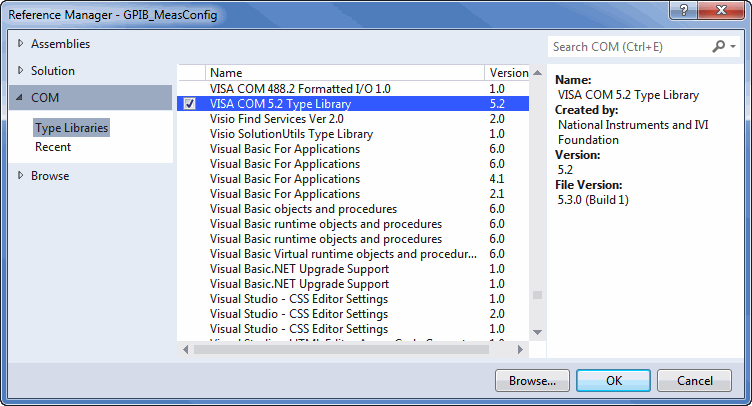Using Formatted I/O
VISA COM I/O comes with a basic Formatted I/O Component that provides 488.2-style formatted I/O capabilities. The component implements the IFormattedIO488 Interface.
Instantiating the Formatted I/O Object
Visual Basic
- Include the following library in Project > References (as seen below):
- The "VISA COM 5.2 Type Library", which corresponds to the GlobMgr.dll file
Use a statement such as
Dim fmio As VisaComLib.FormattedIO488
to create the formatted I/O reference .
Use
Set fmio = new VisaComLib.FormattedIO488to create the actual object.

Figure 1: The Visual Basic Project References Dialog
Visual C++
Use the statement
#import "GlobMgr.dll" no_namespaceto import the VISA COM type library.
Create a variable of type IFormattedIO488Ptr to hold the reference to the object.
To instantiate the object, use the line
rm.CreateInstance( __uuidof(FormattedIO488) )
The IFormattedIO488Ptr type is a specialization of the _com_ptr_t template class defined in comdef.h. See MSDN help on #import for more information.
Using the Formatted I/O Object
Below is sample code for using the Formatted I/O object with various development environments.
Visual Basic
Private Sub CreateResource2() On Error GoTo errorhandler Dim rm As VisaComLib.ResourceManager Dim fmio As VisaComLib.FormattedIO488 Dim session As VisaComLib.IMessage Dim idn As String Set rm = New VisaComLib.ResourceManager Set fmio = New BASICFORMATTEDIOLib.FmtdIOCls Set session = rm.Open("GPIB0::22") Set fmio.IO = session fmio.WriteString "*IDN?" idn = fmio.ReadString() MsgBox "The IDN String is: " & idn, vbOKOnly, "IDN? Result" Exit Sub errorhandler: MsgBox Err.Description, vbExclamation, "Error Occurred", Err.HelpFile, Err.HelpContext
End SubVisual C++
#import "c:\program files\visa\visacom\GlobMgr.dll" no_namespace int main() { IResourceManagerPtr rm; IMessagePtr ptr; IFormattedIO488Ptr fmioPtr; CoInitialize(NULL); try{ // Instantiate the Global Resource Manager and Formatted IO class rm.CreateInstance(__uuidof(ResourceManager)); fmioPtr.CreateInstance(__uuidof(FormattedIO488)); /* Open the session with the default values for the Lock (None), Timeout(N/A), and OptionString (""). The dev_addr can be something like "GPIB0::1::INSTR".*/ ptr = rm->Open(dev_addr, NO_LOCK, 0, ""); _bstr_t idnstr; long count = 100, written; //Using IMessage methods ptr->Clear(); written = ptr->WriteString("*IDN?\n"); idnstr = ptr->ReadString(count); //Using formattedIO methods //First set the IO stream to use for the formatted IO. fmioPtr->IO = ptr; _bstr_t str_result; fmioPtr->FlushRead(); fmioPtr->FlushWrite(VARIANT_FALSE); fmioPtr->WriteString("*IDN?\n", VARIANT_FALSE); str_result = fmioPtr->ReadString(); } catch(_com_error &err) { if (ptr != NULL) { ptr->Close(); ptr = NULL; } if (rm != NULL) { // rm.Release(); rm = NULL; } if (fmioPtr != NULL) { // fmioPtr.Release(); fmioPtr = NULL; } MessageBox(NULL, err.Description(), "Error Occurred", MB_OK); return 0; } // Note that it is very important to close the opened session before // calling CoUninitialize(). Without doing this, there will be a memory // reference problem. ptr->Close(); ptr = NULL; // rm.Release(); rm = NULL; // fmioPtr.Release(); fmioPtr = NULL; CoUninitialize(); return 1; }